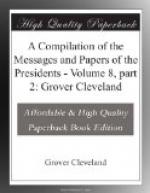In my annual message of 1882 I recommended the abolition of all excise taxes except those relating to distilled spirits. This recommendation is now renewed. In case these taxes shall be abolished the revenues that will still remain to the Government will, in my opinion, not only suffice to meet its reasonable expenditures, but will afford a surplus large enough to permit such tariff reduction as may seem to be advisable when the results of recent revenue laws and commercial treaties shall have shown in what quarters those reductions can be most judiciously effected.
One of the gravest of the problems which appeal to the wisdom of Congress for solution is the ascertainment of the most effective means for increasing our foreign trade and thus relieving the depression under which our industries are now languishing. The Secretary of the Treasury advises that the duty of investigating this subject be intrusted in the first instance to a competent commission. While fully recognizing the considerations that may be urged against this course, I am nevertheless of the opinion that upon the whole no other would be likely to effect speedier or better results.
That portion of the Secretary’s report which concerns the condition of our shipping interests can not fail to command your attention. He emphatically recommends that as an incentive to the investment of American capital in American steamships the Government shall, by liberal payments for mail transportation or otherwise, lend its active assistance to individual enterprise, and declares his belief that unless that course be pursued our foreign carrying trade must remain, as it is to-day, almost exclusively in the hands of foreigners.
One phase of this subject is now especially prominent in view of the repeal by the act of June 26, 1884, of all statutory provisions arbitrarily compelling American vessels to carry the mails to and from the United States. As it is necessary to make provision to compensate the owners of such vessels for performing that service after April, 1885, it is hoped that the whole subject will receive early consideration that will lead to the enactment of such measures for the revival of our merchant marine as the wisdom of Congress may devise.
The 3 per cent bonds of the Government to the amount of more than $100,000,000 have since my last annual message been redeemed by the Treasury. The bonds of that issue still outstanding amount to little over $200,000,000, about one-fourth of which will be retired through the operations of the sinking fund during the coming year. As these bonds still constitute the chief basis for the circulation of the national banks, the question how to avert the contraction of the currency caused by their retirement is one of constantly increasing importance.
It seems to be generally conceded that the law governing this matter exacts from the banks excessive security, and that upon their present bond deposits a larger circulation than is now allowed may be granted with safety. I hope that the bill which passed the Senate at the last session, permitting the issue of notes equal to the face value of the deposited bonds, will commend itself to the approval of the House of Representatives.




